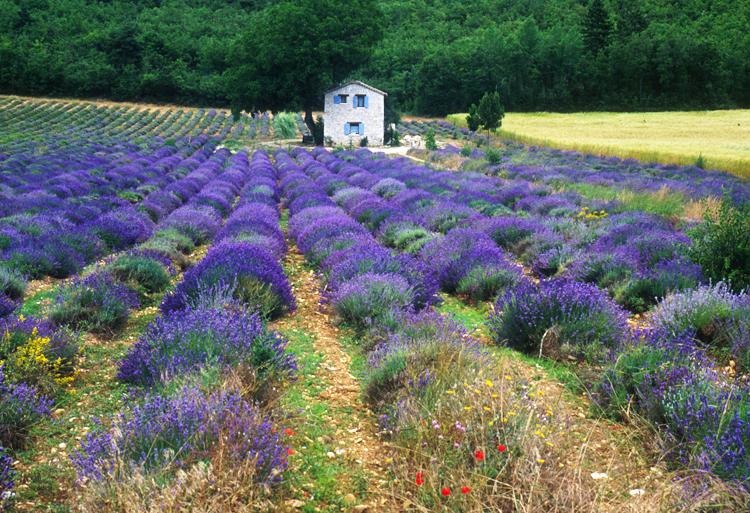Vitex is a member of the Lamiaceae family. It can grow to an impressive tree with beautiful purple flowers. Its vernacular names Chaste Tree and Monk’s Pepper already hint at its main area of interaction with the human organism: The endocrine system.
How Vitex essential oil became an aromatherapy staple
For hundreds of years the herb Vitex agnus castus has been used mostly in form of a tincture for hormone related conditions like menstrual difficulties and menopause. Distillation of the essential oil began relatively recently as it has found its way into aromatherapy only in the early 2000s in a curious twist of events.
In the very early 90ies we visited a scientific Essential oil conference in Munich. There we met Prof Zwaving who presented his decade long research on Vitex agnus castus. As was common he had worked on the tincture or alcohol extract. In private communication he let us know that he was able to prove the effects of Vitex, but that he could not identify an active ingredient responsible for its effects. He went on to speculate that, in his opinion, the active components would have to be in the essential oil.
Consequently we started looking for the oil which was apparently not commonly available. Ultimately we found a farmer in Turkey who would distill Vitex leaf oil for us. Once in stock we put the oil on the list and asked members of the community if they would be interested in trying the oil for its many benefits. As more and more aromatherapy friends came to know and appreciate the oil, this development culminated in the 2 group studies Barbara Chopin Lucks conducted and which were published in PIA conference proceedings.
What is Vitex good for?
The oil is successfully used for the treatment of menopause and andropause, PMS, menstrual discomfort and other symptoms associated with hormonal imbalance. Vitex agnus castus acts directly on the pituitary, normalizing progesterone levels. The exact mode of action, or the active ingredient has not been identified.
Dr. John Lee and the Lucks Studies
At the 5th scientific wholistic Aromatherapy Conference of Pacific Institute of Aromatherapy in San Francisco in 2002 Dr. John Lee, author of Hormone Imbalance Made Simple, suggests that rather than lack of estrogen being responsible for menopausal complaints it may be a dominance of estrogen and an imbalance of progesterone. At the same conference Barbara Lucks presented her extensive research, based on four years of personal use and study with 100 participants.
80% of the participants reported moderate to significant improvement in menopausal symptoms after using the oil 2 – 3 months.
The improvements observed included the following:
Hot Flashes
Mood Swings
Night Sweat
Insomnia
Anxiety
Vaginal Tonus and Lubrication
Comfort with Intercourse
Irregular Periods
Heavy Bleeding
European Research
European research has demonstrated that the herb and the oil of Vitex agnus castus act as dopamine agonist which led the producer of Vitex seed essential oil, Janina Maria Sorensen to bring up the question about its use for Parkinson’s disease and other central nervous system disorders. A desirable side effect of Vitex oil rises from the antiinflammative properties of its sesquiterpene components. Amelioration of arthritis was observed.
Vitex Oil Application
The best application varies from person to person. For some, inhalation might be enough, while for others, topical application of small amounts of oil will provide desired benefits. Ingesting 1 to 5 drops daily may be the best approach for others. As such, the oil should be explored with an open mind to find one’s most successful application. The gentle actions of this oil may take several weeks to get to the core of the imbalance.
References
The studies, “The Vitex Anthology: Explorations in Menopausal Balance” and the “Practical Guide to Vitex,” both authored by Barbara Lucks, can be found in the Proceedings of Pacific Institute of Aromatherapy 4th and 5th Scientific Wholistic Aromatherapy Conferences.
To purchase the 4th Scientific Wholistic Aromatherapy Conferences please click here
To purchase the 4th Scientific Wholistic Aromatherapy Conferences

Leave a Reply